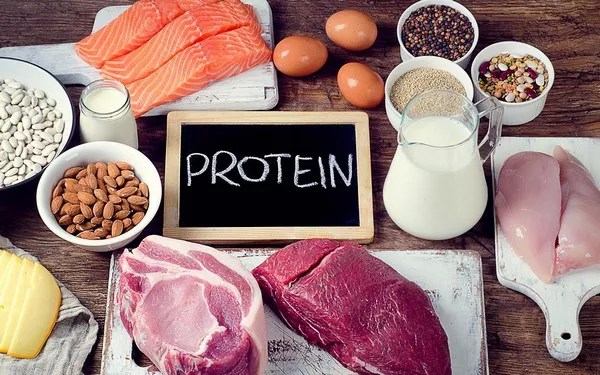Protein is often hailed as the cornerstone of muscle growth, and for good reason. When it comes to building and repairing muscle tissue, this macronutrient plays a pivotal role. For individuals aiming to enhance their muscle mass, understanding the optimal protein intake is crucial. In this article, we will delve into the science of protein consumption for muscle building and provide practical guidelines to help you achieve your fitness goals.
The Importance of Protein in Muscle Building
Before delving into the specifics of protein intake, it’s essential to understand why protein is so vital for muscle growth. Muscles are primarily composed of protein, specifically myofibrillar and sarcoplasmic proteins. When you engage in resistance training, whether through lifting weights or other forms of resistance exercise, you create tiny tears in your muscle fibers. To repair and grow stronger, your body needs an adequate supply of protein.
Proteins are composed of amino acids, which are the building blocks of muscle tissue. When you consume protein-rich foods, your body breaks down the protein into these amino acids, which are then used to repair and build new muscle tissue. In addition to muscle repair and growth, protein also plays a role in various physiological processes that impact muscle development, including the synthesis of hormones and enzymes crucial for muscle function.
Determining Your Protein Needs
The optimal protein intake for muscle building can vary from person to person based on several factors, including age, gender, body weight, activity level, and training intensity. However, there are some general guidelines that can help you determine your protein needs.
Body Weight: A common starting point for calculating protein intake is to aim for 1.2 to 2.2 grams of protein per kilogram (0.54 to 1.0 grams per pound) of body weight per day. The exact amount within this range depends on your activity level and goals.
Activity Level: Individuals engaged in regular resistance training or other forms of intense exercise may benefit from the higher end of the protein intake range, closer to 2.2 grams per kilogram of body weight. Those with less activity may lean towards the lower end.
Goals: Your specific fitness goals also play a role in determining protein intake. If your primary aim is to gain muscle mass, you may want to consume more protein than someone whose goal is to simply maintain their current muscle mass.
Age: As we age, our bodies may become less efficient at utilizing dietary protein for muscle protein synthesis. Therefore, older adults may benefit from slightly higher protein intake to support muscle maintenance and growth.
Quality of Protein: Not all protein sources are created equal. High-quality protein sources, such as lean meats, poultry, fish, eggs, dairy products, and plant-based sources like tofu and legumes, provide essential amino acids in a more bioavailable form, which can optimize muscle protein synthesis.
Meal Timing: Distributing your protein intake evenly throughout the day, rather than loading up on protein in one meal, may be more effective for muscle building. This approach helps maintain a consistent supply of amino acids for muscle repair and growth.
Individual Response: It’s essential to remember that individual responses to protein intake can vary. Some people may thrive on a higher protein diet, while others may not see significant benefits from consuming excessive amounts.
Consult a Professional: If you’re unsure about your protein needs or have specific dietary restrictions, consider consulting with a registered dietitian or nutritionist who can provide personalized guidance.
Practical Tips for Meeting Your Protein Goals
Meeting your protein intake goals doesn’t have to be complicated. Here are some practical tips to help you incorporate enough protein into your diet for muscle building:
Choose Lean Protein Sources: Opt for lean cuts of meat, skinless poultry, and fish to minimize saturated fat intake.
Include Plant-Based Proteins: Incorporate plant-based protein sources like beans, lentils, tofu, and quinoa to diversify your protein intake and increase fiber and nutrient intake.
Protein Supplements: If you struggle to meet your protein goals through whole foods alone, consider using protein supplements like whey protein, casein, or plant-based protein powders. These can be convenient options for post-workout recovery.
Plan Balanced Meals: Create balanced meals that include protein, carbohydrates, and healthy fats to support overall health and energy levels.
Snack Smart: Snack on protein-rich foods like Greek yogurt, cottage cheese, nuts, or protein bars to keep your protein intake consistent throughout the day.
Stay Hydrated: Proper hydration is essential for muscle function and recovery. Ensure you’re drinking enough water to support your exercise routine.
Monitor Your Progress: Keep track of your protein intake and monitor your progress to see how your body responds. Adjust your intake as needed based on your results.
Rest and Recovery: Remember that muscle growth occurs during periods of rest and recovery. Ensure you’re getting enough sleep and allowing your muscles time to repair between workouts.
In Conclusion
Protein is undeniably a crucial component of any muscle-building journey. However, the optimal protein intake for muscle growth is not a one-size-fits-all equation. It varies depending on individual factors, goals, and activity levels. By understanding the principles of protein intake and incorporating practical strategies into your diet, you can maximize your muscle-building potential while promoting overall health and well-being. Remember that consistency in both diet and exercise is key to achieving your desired results, and consulting with a healthcare or nutrition professional can provide you with personalized guidance tailored to your unique needs.


